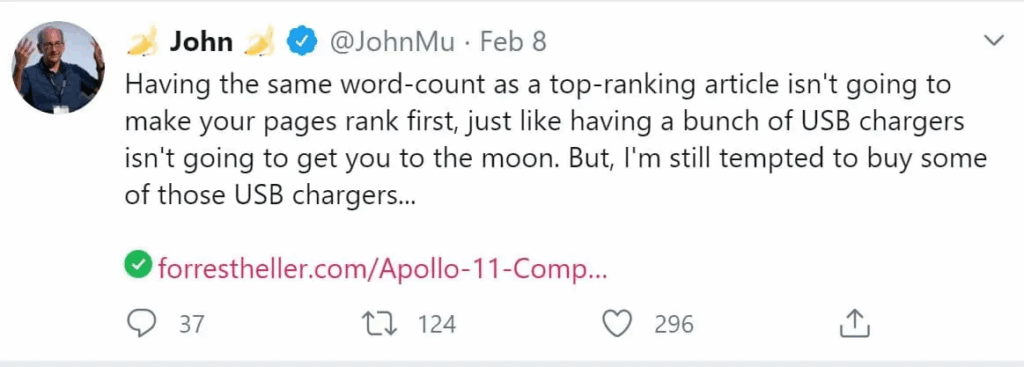
Text length and word count are frequently discussed topics in the SEO world. In this article, we will explore the importance of text content for landing pages and whether the amount of text – that is, the number of words – really matters when it comes to ranking high on Google or not.
What does Google itself say about the number of words in text content?
Google loves text, as it’s the format it can handle best. Even though Google is getting better at understanding images, audio, and video content, text is still what it understands most effectively.
That said, Google has officially stated that text length – meaning the number of words in an article – is not a ranking factor. John Mueller from Google even tweeted about this earlier in 2020.

Google has one main focus: to provide the best possible answer to its users’ search queries. It does this very well, which is the reason why so many people turn to Google with their questions. As Google continues to get smarter and better at understanding search intent, this will inevitably affect the search results—both positively and negatively.
For websites that have tried to simply “stuff in” as many words as possible to gain an advantage, problems may arise once Google realizes that the content doesn’t stick to the main topic of the article but instead drifts off into less relevant areas within the same post. You can easily imagine the frustration of users who are forced to scroll through endless lines of text just to find the information they were actually looking for.
What do case studies in the SEO world say?
As mentioned earlier, this topic is frequently discussed among SEO specialists. Over the years, the recommendations for SEO texts have shifted from 200 words, to 400 words, then 1,000 words, and in recent years even more than 2,000 words. Several studies have been published, most of which suggest that the more text, the better. An early report from 2012 by serpIQ, which analyzed 20,000 keywords, concluded that the average text length needed to reach the number one ranking was 2,416 words. To rank in the top 10, you typically needed around 2,000 words.
In more recent years, larger and more comprehensive studies have been conducted. The most well-known was carried out by Backlinko and BuzzSumo in 2019, analyzing 912 million blog posts. This study found that longer content—over 3,000 words—on average earns 77.2% more links than pages with shorter content. From this, Backlinko concluded the following year (2020) that there is a correlation between more in-depth content and higher ranking positions in search results. However, critics argue that these studies cannot say for certain whether the high rankings come from the number of links or the word count itself.
That a page generally ranks higher if it has many inbound links is not surprising, since Google views links as signals of trust—or “votes,” if you will. A website with many trustworthy and relevant links will almost certainly outperform a site with few or irrelevant links, even if the latter offers a longer explanation.
In the end, the number of words becomes less important to Google if the more credible site can answer the user’s query better in 500 words than a less trustworthy source does in 2,500 words. Ultimately, what matters most is providing the best possible answer to the searcher’s question.
To read the full studies, you can visit them here:
Are there any advantages to longer content?
Having longer content does come with certain advantages, even if it’s not about ranking higher. For example, longer content gives Google more opportunities to interpret and understand what the page is about. Because even though Google is getting better at understanding content, it’s not perfect… yet. By writing a longer, comprehensive article on a topic, you send a strong signal to Google that this is the page where the visitor will find the answer to their query—as long as you don’t drift too far away from the subject.
Another advantage of longer content is, of course, that there are more keywords and phrases you can rank for—the so-called “long-tail” keywords. For example, you can rank for your primary keyword while also capturing other related terms and phrases that you didn’t originally intend the page to rank for.
One example of this is our article “Why You Should Invest in SEO During a Recession”. It ranks first for the phrase “SEO in a recession,” but we also rank third for “Marketing in a recession,” which means the page drives traffic from both search results.
So, there are indeed advantages to writing longer content, even if it’s not a direct ranking factor for Google.
How should you approach writing your content?
Analyze the search intent first
We recommend starting with the searcher and their intent. A good tip is to first search for the keyword or phrase you plan to write about and study the competition, as well as what intent Google assigns to that query.
By doing this, you get a better picture of how much SEO effort is required to rank for the keyword—or at least a useful indication.
Stick to the topic and avoid drifting away
Besides intent, it’s crucial to stay on topic. It’s better to go deep than broad when writing about a specific subject. For example, if you’re writing a blog post on SEO, where competition is high, you’ll want to stick closely to that subject. You don’t want to suddenly branch off into social media marketing just to stretch the article to a certain word count.
Text isn’t the only type of content you should include
Just because Google currently favors text doesn’t mean it will always stay that way. Try to mix your text content with images, videos, infographics, and so on—not only to make your content easier to digest, but also to ensure you can drive traffic from other sources in the future, such as image search or YouTube.
Focus on quality writing
The single most important factor is the quality of your content. Keeping the reader in focus is crucial when creating content. A well-written article that provides a clear and satisfying answer to the searcher’s query will always be rewarded—especially as Google continues to improve its ability to interpret and understand the content we produce.
